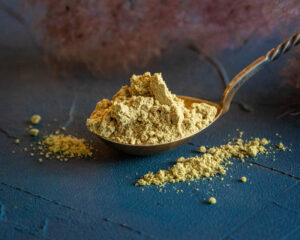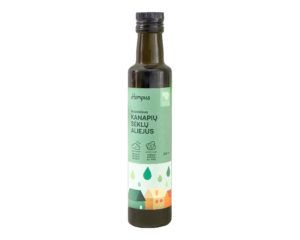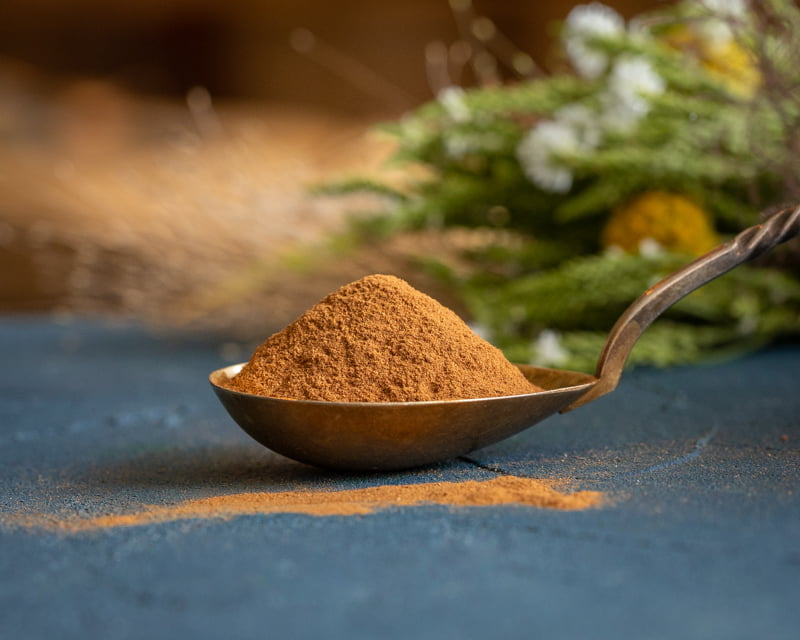

Organic ground Ceylon cinnamon
From 1.98€
Cinnamon has been valued since ancient times not only in culinary traditions but also in natural medicine practices around the world. There are two main varieties of cinnamon, each with its own unique properties and potential health effects: Ceylon cinnamon(Cinnamomum verum/ Cinnamomum zeylanicum) and Cassia cinnamon (Cinnamomum cassia).
We will take a look at the benefits and side effects of both varieties, and discuss the advantages of Ceylon cinnamon, as well as the potential health benefits.
Ceylon cinnamon
Ceylon cinnamon, also known as “true cinnamon”, originates from Sri Lanka and parts of India. It is known for its delicate, mildly sweet taste and aroma.
Ceylon cinnamon contains lower levels of coumarin (a flavouring that accumulates in cinnamon spices), which can be toxic to the liver when consumed in higher quantities. For this reason, Ceylon cinnamon is preferred to cassia cinnamon, which has a higher coumarin content.
In Ayurveda and Traditional Chinese Medicine (TCM), Ceylon cinnamon is highly valued for its healing properties. It is thought to support the digestive system, promote respiratory health and help balance blood sugar levels.
Cassia cinnamon
Cassia cinnamon, commonly sold in supermarkets, comes from China, Indonesia and other countries in South-East Asia. It has a stronger, more pungent taste and smell than Ceylon cinnamon.
Cassia cinnamon contains higher levels of coumarin, which can cause health problems if consumed in high doses over a long period. People with liver disease or taking blood thinners should use it with caution.
Because of its higher coumarin content, TCM practitioners recommend that it be used in moderation.
Main differences
The main difference between Ceylon and Cassia cinnamon is the coumarin content. Ceylon cinnamon has a much lower coumarin content, making it the preferred choice for those with specific health problems or who want to consume cinnamon more frequently.
Ceylon cinnamon has a milder and more refined flavour, whereas Cassia cinnamon has a bolder and spicier flavour, which may influence culinary choices.
Potential health benefits of Ceylon cinnamon
– Ceylon cinnamon is rich in antioxidants,
– Ceylon cinnamon has anti-inflammatory properties.
– Traditionally, Ceylon cinnamon has been used in Ayurvedic medicine to support digestion – to relieve indigestion, bloating, and gas, and to promote better absorption of nutrients.
– Ceylon cinnamon has natural antimicrobial properties that can help fight against certain bacteria and fungi.
Attention. Allergic reactions: although rare, some people may experience allergic reactions to cinnamon, regardless of the variety of cinnamon. Pregnant and lactating women or people taking medication should consult a healthcare professional before significantly increasing their cinnamon intake.
Use of Ceylon cinnamon
Baked goods – Ceylon cinnamon is a great addition to baked goods. Use it in cakes, biscuits, muffins and breads, where cinnamon gives a subtle and aromatic flavour.
Oatmeal – sprinkle a pinch of Ceylon cinnamon on your morning oatmeal or cereal to make your day cosy and delicious.
Smoothies – blend Ceylon cinnamon into your favourite cocktail recipes to add a warm and inviting taste.
Hot drinks – add a pinch of Ceylon cinnamon to hot drinks such as coffee, tea, hot chocolate or chai masala.
Yoghurt – Stir Ceylon cinnamon into plain yoghurt with a little honey or maple syrup.
Stews – Ceylon cinnamon adds a subtle flavour to savoury dishes such as curries, stews and sauces.
Rice dishes – Sprinkle Ceylon cinnamon on rice dishes such as biryanis or ploughman’s to enhance their flavour.
Fruit salad – mixCeylon cinnamon with fresh fruit such as apples, pears or mangoes to create a refreshing and aromatic fruit salad.
Desserts –Use Ceyloncinnamon in a variety of desserts including ice cream, puddings and fruit crisps.
Enjoy the extraordinary aroma and the unique flavour that Ceylon cinnamon brings to your dishes!
In summary, Ceylon cinnamon is an excellent spice that not only adds flavour to dishes but can also have health benefits. Incorporating Ceylon cinnamon into your culinary creations can be a great way to not only enjoy its unique flavour and aroma, but also to maintain your well-being. Enjoy the warm and aromatic mood that Ceylon cinnamon brings to your kitchen.
Cinnamon Tea Recipe – www.alphafoodie.com
Ingredients
2 medium cinnamon sticks or 3 teaspoons of cinnamon powder; use Ceylon cinnamon if possible,
6 cups of water
1/2-1 tbsp of black tea leaves about 5 g
1 teaspoon of maple syrup or your choice of sweetener to taste (not necessary).
Pour water into a saucepan or teapot and add cinnamon sticks or cinnamon powder and bring to the boil over medium heat. Once boiling, reduce the heat to low and simmer for 10 minutes.
Remove the pot from the heat and add the black tea leaves (you can strain later). Allow the tea to steep for 1-2 minutes, depending on how strong you want it to taste. If you leave the cinnamon sticks in the teapot, the flavour will become stronger and stronger. If you find it too intense, you can dilute it with a small amount of hot water.
Cinnamon Iced Tea
While the tea is still warm, add a sweetener of your choice and taste. Place in the fridge to cool. You can serve the cooled cinnamon tea with freshly squeezed lemon juice.
Enjoy!
The recommended daily intake is no more than 5 g.
Sources:
https://www.webmd.com
https://www.healthline.com
NOTE. The information contained herein should not be construed as a recommendation for treatment or other health issues. We encourage you to make personal decisions about your personal health, taking into account a wide range of sources of information.
Organic Ceylon Cinnamon 100% (Cinnamomum zeylanicum)
Energy
Fat
- of which saturated fat
- of which monounsaturated fat
- of which polyunsaturated fat
Carbohydrate
- of which sugars
Fibre
Protein
Salt
Store in a cool, dry place away from direct sunlight.
